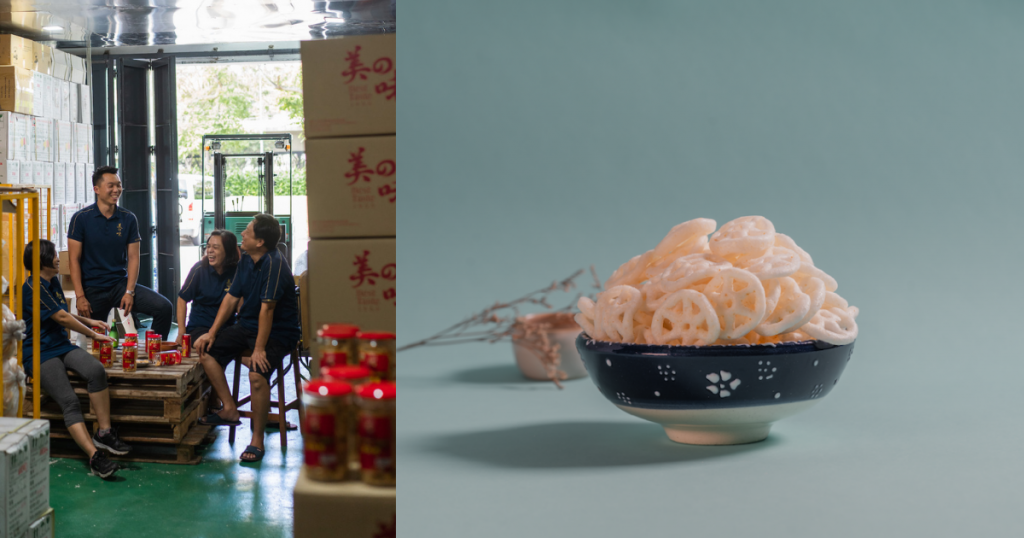Snacking is a favourite past-time for Singaporeans. For many, the traditional snacks that they grew up with are the ones that hit the spot.
Even though snacks have been getting more innovative these days, the iconic ‘butterfly crackers’ and ‘potato wheels’ are classics from our childhood that Singaporeans can fall back to.
Thankfully, most of the snacks are still available in shops and specialty stores so we don’t have to depend on nostalgia.
One such specialty store is third-generation homegrown brand KrackerKing.
Perfecting Singaporean snacks since 1955

At the helm of KrackerKing is 31-year-old Ko Yu Quan, who’s also the representative of the brand’s third-generation of owners.
Yu Quan told Vulcan Post that his father passed on while he was in his first year at Nanyang Technological University. It was then that he decided to take over the Ko family’s business as he became the sole breadwinner of the family.
The business was not doing well back then. They struggled to keep up with competitive demands and KrackerKing was on the verge of shutting down.
With no prior experience, the then-Business Analytics student had to learn everything from scratch and remodelled what was previously a food import business into a snack manufacturing business.
“Slowly, we cleared our debts and began our journey to build our roots in Singapore, with the dream to branch out and become an international snack brand,” said Yu Quan.

KrackerKing was first founded in 1955 by Yu Quan’s grandfather, who started out with making ‘love letters’ and frying prawn crackers at home, selling mainly to the neighbourhood.
The snacks were well received and in the 1960s, his grandfather started expanding his range of products to tapioca chips, plums, and other kinds of snacks like coconut biscuits.
They were an instant hit amongst the local community, and it developed a strong following across the country.
As demand started to grow, he decided to shift into a manufacturing facility. KrackerKing first established its presence in the region around the late 1970s as exports to Sabah and Sarawak soared, and later expanded to Batam and Brunei in the 1980s.
In the 1990s, as the country transformed itself from a manufacturing-based industry into engineering and technology, his grandfather decided to wind up the manufacturing part of the business as they faced difficulties in relocating.
They also faced manpower issues and a drop in exports sales as the Singapore dollar strengthened against Malaysian ringgit.
The company began procuring snacks from all over Asia, and distributed them in Singapore instead.
Refining old tradition

Although the business stopped manufacturing snacks, Yu Quan’s grandfather’s recipes were well-kept and he often made crackers for family and friends during festive periods.
But after Yu Quan managed to clear most of the old business debts, he decided to venture into food manufacturing to share his grandfather’s recipe with the world.
According to Yu Quan, KrackerKing’s snacks are guided by traditional recipes and inspired by cosmopolitan palates.
The snacks are made with fresh, locally-sourced produce from farms all over Southeast Asia. These raw ingredients are harvested just in time for production, to avoid pre-cooking anything just for stock-keeping purposes.
By clocking in as little storage time as possible, KrackerKing ensures that its snacks reach customers crunchy, fresh and delicious.
It also invests in technology that makes healthier snacks. A special part of its production process is de-oiling, where crackers are transferred to a Centrifugal De-oiling system after frying, and spun around for 30 to 45 seconds.
This technique removes excess oil from the crackers, creating healthier snacks for customers.
Becoming the leading ‘keropok’ supplier

KrackerKing now supplies to more than 200 major retailers and distributors in Singapore, including supermarkets like FairPrice, Sheng Shiong and Prime Supermarket.
However, the road to getting to where it is today has not been easy. Yu Quan said that there have been many challenges when attempting to create a brand identity in such a large market.
Even though traditional snacks are popular, Yu Quan feels that they have not received enough recognition over the past decades.
However, success to Yu Quan comes in the form of “satisfied feedback and kind praises from customers.”
“It could be about the taste of our food or the packaging design and the brand itself. We love making people happy with our snacks,” he said.
This is why the brand has ramped up its efforts to engage the younger audience, as it aims to become “The Asian Snack that the World Snacks on”.
Featured Image Credit: KrackerKing
Looking for more delectable treats to discover? Discover more F&B brands on VP Label:











